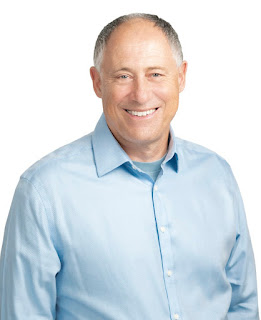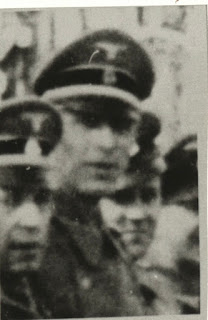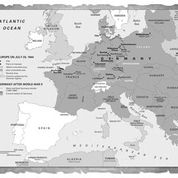Ann Bausum is an award-winning author of 16 works of
nonfiction for children, teens, and adults. Her books often explore under-told
stories and examine social justice history, but she’s also written twice about
a famous dog! Earlier this year National Geographic published her latest book
for middle graders and up: Ensnared in
the Wolf’s Lair—Inside the 1944 Plot to Kill Hitler and the Ghost Children of
His Revenge. [http://www.annbausum.com/ensnared-in-the-wolf's-lair.html] Find out more about her work at her
website: AnnBausum.com. [http://www.annbausum.com/index.html]
1. How and/or
when did you get you hooked on history?
My interest in history dates to fourth
grade if not before. That was the first year I studied history in school, and I
fell in love with the subject. It probably helped that my father was a history
professor and that I lived in an historic area in Virginia, so I didn’t just
read about history—I was surrounded by it.
What I didn’t know at the time was that
my community (Lexington) and my state history books offered a distorted view of
the past that had been heavily influenced by the so-called Lost Cause mythology.
I was in my 20s before I realized how misled I’d been by this false historical
narrative. My love of history was undiminished, but ever since I’ve been guided
by a passion to examine the past truthfully, warts and all.
2. What role does history play or has it played in your
personal life?
In addition to being steeped in history
through my surroundings, I grew up during an era crammed with significant occurrences.
My first memory of current events was the assassination of President John F.
Kennedy when I was in first grade. Plenty of other notable events followed with
the Civil Rights Movement, additional tragic assassinations, the Vietnam War,
Watergate, and so on.
At the same time the country was
undergoing a social transformation. My mother was an educator, too, and she modeled
the possibility of being a working mother. I attended high school in the Washington
DC area and volunteered on Capitol Hill during my junior year for my local
congressman. The Watergate investigation was underway and my representative served
on the House Judicial Committee during those Congressional inquiries. During
one of my volunteer sessions I three-hole-punched the entire set of transcripts
that had been obtained by court order from the Nixon White House. How could I
not get caught up in history? I had touched it, literally, and I would forever
be drawn to its pursuit.
3. How will history play a part of your professional
life/career?
Now I research and write about history
for young people and teens. I’ve pursued this passion for more than two
decades, and I have no plans to stop anytime soon. There are so many
underappreciated topics to explore, and it seems more important than ever to offer
the newest students of history the facts and the context that will help them understand
the past and make a difference in the future.
4. Why is studying/knowing history important?
I’ve focused my career on writing about
the underbelly of our past. Some might say it’s better to focus on the most
admirable stories. I cherish examples of human achievement at its best, but I
also think we must plumb the depths to find lessons of pitfalls that would
better be avoided than repeated. As individuals we practice facing our demons
and learning from past mistakes. We would do well to follow that same therapy
collectively.
5. What is your favorite period or aspect of history to
learn about and why?
I’ve been particularly drawn to two
periods of U.S. progressive social change: the opening decades of the 20th
century and the 1960s. But I’ve explored other countries and eras, too. More
than anything I’m drawn to those under-told stories that deserve to be
reclaimed from obscurity. The hidden gems of history offer unexpected
inspiration and diversion. We may value seeing familiar masterpieces at a
museum, but often it’s the previously unknown painting that catches our eye and
comes back to stir our imaginations later own. History can work the same way.
And although I tend to focus on stories
from the darker side of history, every now and then something different comes
along, like Stubby, the stray dog who joined the fight during World War I and
came home to a hero’s welcome. This loveable creature insisted that I write
about him not once, but twice, and I enjoyed the diversion immensely. One of
Stubby’s unofficial roles during and after the war had been as a therapy dog. I
later realized he’d offered the same comfort to me between my forays into more
troubling history.
6. How did you begin writing history books for young people?
My story is surprisingly similar to
those of other children’s book authors: I found my way to this genre through
the eyes of a child, or in my case three children. The first one was me. I
adored reading children’s literature during my youth, and becoming an author of
such books was an early career goal. I have always made my living by writing,
but it wasn’t until I had two sons of my own that I found my way back to this
earlier ambition. I watched books influence them the way they had once
captivated me, and I had my eureka moment. Maybe I could apply my writing
skills to this seminal genre. I’ve never turned back.
7. Your most recent
book is Ensnared in the Wolf’s Lair. What is it about and how did you
choose this topic?
This book examines a little-known story from World War II
history: Hitler’s vengeful response to the failed 1944 attempt to assassinate
him and overthrow his regime. Most adults and some younger readers will know
about the doomed Valkyrie plot, but few beyond German have focused on the punishments
that followed not just for the captured conspirators but for their family
members. More than 200 relatives were apprehended, ranging from elderly to
newborn. Younger children were separated from their surviving parents and held
for weeks or months in secret detention. These youngsters—who gained the name
of ghost children during their captivity—are now in their eighties, and I was
fortunate enough to interview several of them for this project. One of them had
kept a diary of her experiences as a twelve-year-old, and she permitted me to
draw from her text for my narrative.


My interest in this topic coincided with the 2018 separation
of children from older family members at the U.S. southern border. I often
examine stories from the past that can be used as a window for viewing current
events. This history, with its focus on the role played by misinformation,
propaganda, and fearmongering during the rise of Hitler, and the example of Hitler’s
obsessive pursuit of revenge without regard for family suffering, seemed like a
valuable episode to examine during this time of global unrest.
Looking ahead I’ve returned my gaze to my childhood and am
examining the origins of that Lost Cause mythology. It’s not enough to know
that I was misled. I want to understand the forces behind this deception. I
hope the insights I gain can help to disarm a propaganda that continues to
influence and distort our understanding of our nation’s past—and ourselves.












